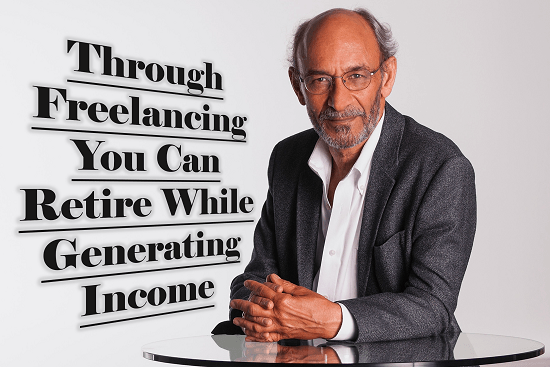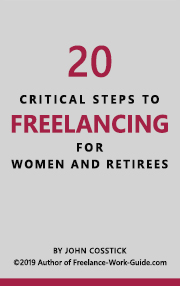Once you’ve retired, that’s it, right? Yet, more and more there are retirees freelancing! Why?

You’ve given up work, and now it’s time to settle down and get on with enjoying your golden years while you have the chance.
Unfortunately, that’s not how it goes for many retirees. Work ends, but the desire to apply oneself and experience challenges doesn’t. Retirees find that they want more from life than relaxation and holidays – they want a reason to get up in the morning and, often another source of income.
Retirees need to recognize that freelance work isn’t like regular 9 to 5 employment. It doesn’t involve turning up at an office every day and sucking up to a boss. There’s none of the usual corporate pressures or politics. It’s just working directly for clients and trying to give them what they want.
For this reason, retirees can usually get the best of both worlds. Freelancing allows you to do something creative, valuable, and productive, but without many of the downsides of working a regular job.
In this article, we’re going to look at ten of the most compelling reasons why you should freelance as a retiree. You’ll be surprised at just how much of a rewarding experience it can be.
1. It Provides You With An Opportunity To Socialize

While most people complain about work, there’s quite a lot of evidence that they like it. Most people are productive enough today to work one or two days per week to meet all their basic needs. Yes, they might have to move to a smaller property and ride a bicycle, but it can be done. The funny thing is that most people don’t.
Economists think that the reason for this is that people like the work they do. They enjoy the challenge, the people, and the meaning it brings to their lives. Working hours remain high, in their view, not because people are in a desperate treadmill to acquire material wealth, but that leisure time isn’t as valuable as people think.
Many retirees find themselves coming to the same conclusion. They choose to do freelance work because it offers many of the benefits of the 9 to 5, but without the drudgery. You get to interact with people, make new friendships, and generally feel connected to the broader world. It’s an overwhelmingly positive experience.
2. Keep Your Mind Active

Researchers believe that one of the ways that seniors can fight cognitive decline is to keep their minds active. The more you use your brain as a person of retirement age, the healthier it will be.
Freelance work has a habit of keeping your mind active. In fact, because of the nature of the work, it’s probably better than the average 9 to 5. Working independently on creative projects forces you to engage your brain in new and interesting ways.
There’s never a dull moment. You’re continually searching for novel solutions to interesting problems and don’t rest until you have found them. You become a kind of problem-solving machine, utilizing parts of your mind you never had the chance to exercise during your regular career.
Keeping your mind active is vital, not just for productivity purposes, but for life in general. With a keen intellect, you can have more engaged and fulfilling relationships with the people around you.
And you can enjoy cognitive activities, such as playing music, reading books, and playing games. Freelancing continually keeps you on your toes and gives you a reason to exercise every aspect of your intelligence, should you choose to use it.
3. Keep Boredom At Bay
Making the transition from work to retirement can be a challenge for some people. Before you retire, you think that nothing could be better than spending your time how you like with no career or boss to worry about.
But you soon find that your life feels a little sluggish and empty. You long for something that will occupy your attention and help to keep the boredom at bay.
The great thing about freelancing as a retiree is that you have a choice not to be bored. You can start offering services as much or as little as you like depending on when the mood strikes you, and you can continue to feel valuable. The work you produce has a real impact on the lives of other people in your community.
It’s worth pointing out that you don’t have to pick some esoteric aspect of website programming to make it in the freelance world. Often you can pick up where you left off with your career and offer a similar kind of service on a freelance basis.
Or, if you have transferable skills, start something completely new. Who says you can’t be a freelance writer? Who says that you can’t start a consulting enterprise? Nobody.
4. Achieve Your Perfect Work-Life Balance

The reason freelancers love their work so much is that it gives them a type of flexibility that you don’t get in any other line of work. As a freelancer, you’re free to work as much or as little as you like. How much you work can change from week to week and accommodate whatever might be going on in your life.
Let’s say that you’ve got the grandchildren coming over and you want to spend time with them. As a freelancer, it’s easy. You just change your hours to fit around whatever you’re doing. You could work a couple of hours in the morning and then spend the rest of the day at the park with the kids. The choice is entirely yours.
Even if you’re not sure how many hours to work in the week to achieve a “perfect work-life” balance, you don’t have to know in advance with freelance work.
You might think that 20 hours is quite enough for a retiree, but after a couple of months, you could find out that, you want more. With a part-time contract, you don’t get that kind of radical flexibility.
5. You Give Yourself The Option Of Dipping Back Into The World Of Work

Not all retirees are retired out of choice. Some retire early because they find it impossible to get work because of their age. Employers don’t want to take on older people because they don’t see them as being as valuable as younger competitors.
As a freelance retiree, you can soon smash that falsehood. Working as a freelancer provides you with plenty of opportunities to hone your skills and retain your talent. It can also give you a strong negotiating position if you ever do decide to go back into the regular world of work.
You can point to your freelance work as an example of your success, motivation, and willingness to get on the with the job. You may find that former employers want to outsource work to you or hire you again on a “contract basis” – something that usually pays a heck of a lot more than your old salary.
6. Continue To Generate Income

Retirement is often a financially stressful event. People hit retirement, look at the pile of money that they’ve accumulated, and then worry that it will eventually dwindle to nothing. It can be downright scary. You never know how long you’re going to live or whether some catastrophe in the stock market will annihilate your wealth.
Having a secondary income, therefore, is a kind of insurance. It provides you with the emotional and financial cushion you need to get peace of mind.
What’s impressive about freelancing is how it snowballs. One moment, you’re doing entry-level work through an agency, and the next, you’ve attracted a whole bunch of wealthy clients who want the benefits of your services.
You can soon make a name for yourself and get a level of satisfaction you never had in your regular career. It’s an exciting prospect.
7. Put Your Experience And Knowledge To The Test

As a retiree, you’ve built up a wealth of knowledge. You might have forty years or more of experience working in a sector or role. In that time, it’s highly likely that you’ve built up a vast, tacit understanding of the industry – something that you can use as a freelancer.
Retirement is, in a sense, a tragic loss of expertise. People who have a deep understanding of how the world functions fade out of the labour force, taking their knowledge with them.
Every year, millions of people stop generating value for others with the experience that they have, and it’s lost forever.
Of course, with freelancing, you don’t have to go down this route. You can bring the knowledge that you have to bear on the problems of the day and assist your clients.
Many retirees, for instance, take on freelance consulting roles. They temporarily pop out of retirement to provide knowledge to people struggling in business to make sense of a situation or project.
A company might not want to take you on as a full-time employee, but they’ll undoubtedly pick your brains if there’s something they’re puzzling over.
8. Get Satisfaction From Your Work
Many retirees reflect on their working lives like a prisoner would look back on their time behind bars. People often use phrases lifted right out of the legal system, such as”I did my time,”or “I paid my dues.”
It’s a sad reflection of the way that many retirees look back at their work. It’s something that they did because they had no other choice, not something that they wanted to do to achieve fulfillment.
A lot of this attitude has to do with the nature of the work. Not everybody can do something creative, or that involves their passion.
Most people had to make do with what was on offer, whether that was working in a factory or shuffling papers in an office. It’s a tragedy that so many people end up doing work that doesn’t provide a real test of their capacities as human beings.
Freelance work is different. The operative word in freelance is “free” – you don’t have to do anything you don’t want to do. What’s more, you get to choose the type of work that you do and the projects you take on. If you don’t like the idea of a request, you can turn it down. Nobody is forcing you to do anything.
Freelancing, therefore, is a route to genuine job satisfaction. Finally, you can do something that stretches your capacities and provides tangible value to others.
9. Indulge In Work You’ve Always Wanted
Retirement is supposed to be a time where you do all the things that you don’t have time to do in regular working life. You can take long holidays, explore new parts of the world or pursue your hobbies.
But with freelancing, there’s another opportunity: to indulge in work you’ve always wanted. For many people, work is a means to an end.
It’s something you do because it provides money so that you can look after yourself and your family. It’s not always fun, but that doesn’t matter it provides financial stability.
But with freelancing, you’ve got a choice. You don’t have to do something just because it pays the bills. You have the freedom to branch out and try something new. Even if the pay isn’t great to start, that doesn’t matter you’re a retiree. You can afford to take liberties.
10. You Take Genuine Responsibility For Your Life
A lot of people who are new to the world of freelancing don’t realize how much responsibility it entails. Nobody is going to ring you up and ask why you’re not coming into work. You don’t have a boss assigning tasks. It’s all on the back of your effort.
Whether this is a good thing depends on your personality. If you’re the kind of person who has always yearned for independence and control over the direction your life takes, then it could suit you down to a tee.
Freelancing as a retiree lets you make your own way in your economic life, giving you a taste of what it’s like on the other side.
We have a PDF downloadable book called 20 Critical Steps To Freelancing For Women And Retirees. You can read more about Freelancing For Women And Retirees by clicking on the icon below:

$ 5.00















